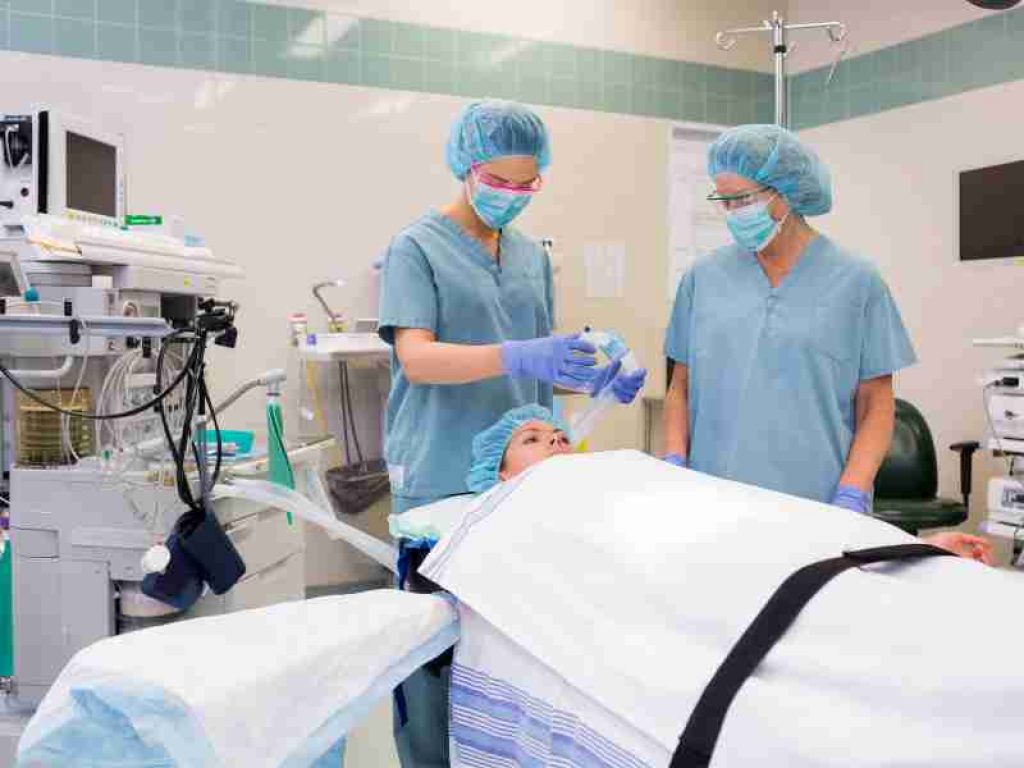
What Does A Perioperative Nurse Do?
Nurses play a crucial role in the healthcare system and may choose to specialize in a particular area of nursing. Providing care in a surgical setting is one of the nurses’ most sought-after areas of expertise.
If you’re considering a career in nursing, learning about perioperative nursing will help you decide if this subspecialty is right for you.
In this post, we’ll go over the basics of surgical nursing, including its three phases, the responsibilities of perioperative nurses, the conditions in which they operate, the training and certification requirements, and more.
What is Perioperative Nurse?
Depending on the context, the term “operating room nurse” may refer to a nurse specializing in caring for patients in the perioperative period before, during, and after surgery. They help doctors and surgeons while they perform procedures.

To become a perioperative nurse, one must undergo additional education and work in the field. It’s an essential part of nursing that helps keep things moving smoothly in the hectic environment of the operation room.
There are 3 tiers of surgical nursing care.
For a quick recap, here are the three phases of perioperative nursing care:
Preoperative phase:
Before surgery, the patient goes through an admission process. This is one of several administrative tasks a perioperative RN is responsible for. When a new patient arrives at the hospital, the nurse takes down pertinent information and accesses the patient’s file.
The patient is then transferred to the appropriate hospital ward. The nurse then discusses the patient’s condition with the on-call surgeon or doctor, who then decides which diagnostic procedures the nurse can carry out. As a result, the group can take the next logical step.
Operative Phase:
Surgery is what happens at this point, as the term suggests. The goal is a risk-free resolution to the patient’s issue. Anesthesia is administered, and the perioperative nurse is there to help the anesthesiologist do so safely and by hospital protocol.
The perioperative nurse may assist with intubation, administer medication, and calm the patient before surgery. Once the anesthetic has taken effect, the surgical team can begin their work. At this point, the perioperative nurse is responsible for ensuring the operating room is stocked with everything the surgeons need.
They monitor the patient’s vital signs and ensure the operating room is clean. The final step in the surgical procedure is to remove the patient from anesthesia. An anesthesiologist and a perioperative nurse are needed for such a delicate procedure.
After anesthesia has worn off, they also aid in keeping tabs on the patient’s vital signs. The nurse may need to check in with the patient, find out how they’re feeling, and fill them in on their location and procedure status.
Postoperative phase:
This is the last step in the perioperative procedure and is crucial to the success of the surgery and the patient’s recovery. The perioperative nurse will continue to check in on the patient for several days or weeks after surgery. They make that the individual reacts positively to treatment and recovers normally.
The surgeon’s postoperative duties also include ensuring the patient receives the appropriate care and diet. The patient is ready for discharge once they have reached maximum medical improvement. At this point in the postoperative process, the nurse discusses general health and recovery with the patient and their loved ones.
What are the duties of a perioperative nurse?
A perioperative nurse is an R.N. whose primary place of employment is in a hospital’s operation room. This nurse provides preoperative, operative, and postoperative care for patients undergoing surgical procedures.
The perioperative nurse’s duties in the operating room might range from those of a scrub nurse, who chooses and passes the tools and supplies needed for the procedure, to those of a circulating nurse, who oversees the room’s general nursing care and helps to keep patients calm and relaxed.
Where do Perioperative Nurses work?
Perioperative nurses can work at any hospital or clinic where surgical procedures are performed. Surgical care can be obtained in various settings, including hospitals, outpatient clinics, ASCs, and general practitioners’ offices. These nurses may be assigned to a variety of divisions within these businesses.
Some patients, for instance, may need immediate surgical attention and then be transferred to the intensive care unit. In this case, a perioperative nurse may consult with intensive care unit staff on postoperative care and patient expectations.
Work environments that value expertise in a particular field are another option for candidates. It’s not uncommon for perioperative nurses to specialize in a certain area of surgery, including cardiothoracic, pediatric, or oral surgery. These areas of concentration necessitate talking to workers who specialize in that area.
What does a Perioperative Nurse do?

Some examples of what perioperative nurses do:
Treat people and care for them:
All through the perioperative period, perioperative nurses frequently offer patients with basic care. Frequently, they are the ones to provide initial life-saving care to patients in emergencies. They can conduct such fundamental medical tasks as wound cleaning, blood clot assistance, pain medication administration, and more. The perioperative nurse also monitors the postoperative patient to ensure they take their medications and eat properly.
Help out in the medical community:
Perioperative nurses are primarily responsible for aiding other medical staff members. They collaborate with medical professionals like MDs, DOs, surgeons, NPs, and APs. The perioperative nurse typically arrives in the operating room to check that everything is in order and that the patient is comfortable.
They help other medical personnel prepare for surgery by cleansing and donning surgical garb. Because of their important role, these medical experts must be well-versed in various surgical procedures and tools.
Carry out administrative duties:
The perioperative nurse’s role consists largely of paperwork and recordkeeping. Patients’ first encounter with the hospital is usually with them. They aid in finding and retrieving patient records and obtaining any further data that may be necessary.
In addition to ensuring that patient records are accurate and safely stored, perioperative nurses are also responsible for updating records as necessary. Depending on their profession, they may also be responsible for handling payments, collecting patient notes, and updating medical files.
Monitor patients:
After surgery, patients need close monitoring by nurses specializing in perioperative care. Patients in critical care can be stabilized for successful surgery with their assistance. The patient’s heart rate and other vital signs are monitored during the operation to ensure their safety. The perioperative nurse’s job is to check in on patients after surgery to ensure everything goes smoothly with their recovery.
Advising:
After an operation, the patient and their loved ones speak with the perioperative nurse. They brief them on what to expect during surgery and how best to aid the patient’s rehabilitation. Nutritional and physical exercise recommendations are two examples of the broader health advice nurses may offer. It is common practice in some facilities for nurses to phone patients periodically to inquire about their well-being and progress.
Maintenance of Medical Devices:
Preventative care for medical devices and infrastructure is a top priority for perioperative nurses. Both the operating room and the surgical tools are kept sterile during the procedure. They also help doctors and nurses set up the necessary instruments for operation. After use, the tools must be returned after being cleaned, checked for damage, and returned to working order.
Working Benefits of Perioperative Nurse
Working as an operating room nurse is a demanding, fast-paced, and complex nursing field. Giving one hundred percent of your attention to a single patient is the best part of being an operating room nurse. This frees nurses from juggling the needs of several patients at once, allowing them to provide better patient care to each individual.

Additionally, the vast majority of operations are performed within normal business hours. The situation can be greatly improved for nurses unable to work the night shift. Trauma centers need nurses on both the day and night shifts because of the constant stream of urgent procedures performed by surgeons.
On holidays, fewer surgeries are scheduled; thus, fewer people must be on hand to perform them. Doctor-patient interactions in the operating room (OR) are unique. Surgeons and operating room nurses have the kind of dynamic, team-focused connection that isn’t always the norm elsewhere in the hospital.
When a surgeon scrubs in, they rely on the circulating nurse to provide supplies, equipment, or instruments they might need. The nurses working in the operating room are experts at fixing broken machines and learning to use cutting-edge new devices.
Perioperative nurses enjoy the rewards of helping patients heal from traumatic injuries, including broken bones, cancer, and arthritis, through surgical procedures. All amazing things that are even more impressive when seen and helped with in person.
How to become a Perioperative Nurse?

To pursue a career as a perioperative nurse, you should:
Become a licensed nurse:
Becoming an RN is the starting point for a career in perioperative nursing. To become an RN, consider the following.
Earn a four-year degree:
Due to the importance of the nursing profession, most provincial governments stipulate that prospective nurses hold a bachelor’s degree. However, a diploma of collegial studies or a bachelor of science in nursing earned in less than four years is sufficient. Ensure the appropriate nursing nurses have approved the school you’re considering before enrolling there.
Pass the NCLEX exam:
The next thing to do is to get licensed by the National Council (NCLEX). You can take this test once registered with the appropriate provincial regulatory agency. Registering and taking the test themselves are usually possible online.
Comply with additional needs:
To become an RN, you need to meet these four standards. All jurisdictions share these common legal criteria. To name a few of them…
- Bilingual Proficiency
- Documentation showing registration or eligibility for registration in the province where you received your formal education
- Citizenship of Canada, permanent residence in Canada, or a work permit issued under the Canadian Immigration and Refugee Protection Act
- Evidence of integrity and long-term viability
Gain experience in the operating room:
Employers usually expect perioperative nurses to have prior operating room experience, which is why they are highly sought after. If you are a registered nurse, you may have the opportunity to observe surgeries by asking for a shift in the operating room. Taking this course will fulfill this requirement and help you decide whether or not you want to become a perioperative nurse.
Consider obtaining more credentials:
Certification is a great way to prove your knowledge and expertise to employers. A number of groups, like the Competency and Credentialing Institute, offer certification programs for nurses (CCI).Verify that you meet all of the prerequisites before attempting these tests.
Look for work:
When you’re ready, check out the available positions in your area of choice. Also, think about asking for a raise in your current job. Last but not least, ensure you study for your interview and any other evaluation forms.
Skills of Perioperative nurses
A perioperative nurse needs to be proficient in the following areas:
Communication skills:
The capacity to convey information swiftly is essential for perioperative nurses. It’s a step toward ensuring effective care and a satisfactory experience for the client.
Careful consideration:
Patients undergoing surgery are under the constant care of perioperative nurses. A keen eye for detail is essential to spot and address issues before they escalate.
Strength of body:
It’s not uncommon for nurses to be on their feet for several hours during surgery. They need to be physically robust to handle the challenges of the position.
Empathy:
Patients often feel anxious before surgery. Compassion is essential for perioperative nurses tasked with making their patients feel at ease throughout the surgery.
Teamwork skills:
The perioperative nurse collaborates closely with other medical staff nurses. Cooperation and success depend on collaborative skills.
What is the salary of a perioperative nurse?
A perioperative nurse’s income can go up or down depending on factors like experience, employer, and the specifics of the position. An entry-level perioperative nurse can expect to make a median annual salary of $58,240, or $28 per hour. Veteran nurses can make up to $83,200 annually, which is about $40 per hour.
When the need for highly skilled operating room nurses is considerable, salaries for perioperative nurses may rise above national medians. Overtime pay is other perk nurses enjoy.
Conclusion
Perioperative nurses are highly sought after and need to possess a set of skills such as communication, careful consideration, the strength of body, empathy and teamwork skills. They also need to be bilingual (English/French) and have the necessary documents for registration in the province where they received their formal education. The income for a perioperative nurse can range from $58,240-$83,200 annually, depending on experience and other factors.







